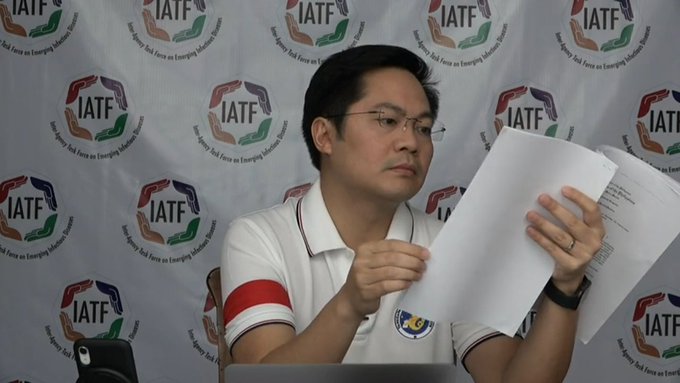Headline
Authorities bound to safeguard Covid-19 patients’ privacy

Cabinet Secretary and IATF spokesperson Karlo Nograles made this reminder after the IATF adopted the policy of mandatory public disclosure of personal information relating to positive Covid-19 cases to enhance the contact-tracing efforts of the government. (File photo by azereraser via @pnagovph/Twitter)
MANILA – The Inter-Agency Task Force for the Management of Emerging Infectious Diseases (IATF-EID) on Monday urged authorities to make sure that they comply with the Data Privacy Act or Republic Act 10173 when handling records of patients infected with the coronavirus disease 2019 (Covid-19).
Cabinet Secretary and IATF spokesperson Karlo Nograles made this reminder after the IATF adopted the policy of mandatory public disclosure of personal information relating to positive Covid-19 cases to enhance the contact-tracing efforts of the government.
Currently, the Office of Civil Defense (OCD) is in charge of leading the government’s contact-tracing efforts in coordination with the Department of Health (DOH).
Nograles said that despite the existence of the Mandatory Reporting of Notifiable Diseases and Health Events of Public Health Concern Act or Republic Act 11332, data privacy rights should also be observed.
Under RA 11332, notifiable disease refers to a disease that, by legal requirements, must be reported to the public health authorities.
RA 10173 allows the processing of personal information to respond to national emergency, to comply with the requirements of public order and safety, or to fulfill functions of public authority which necessarily includes the processing of personal data for the fulfillment of its mandate.
“Kailangan po natin i-harmonize ang provisions ng (We need to harmonize the provisions of) Republic Act 11332 ito po yung (which is the) Mandatory Reporting of Notifiable Diseases at yung (and the) Data Privacy Act,” he said in a virtual presser on Monday.
Nograles said the DOH will come up with guidelines on data sharing, contact tracing, and use of mandatory disclosure of patients.
He also clarified that patients’ information will only be disclosed to the DOH, the “safekeepers of the information”, and not the public.
“Gagamitin ng Department of Health itong information na ito para gumawa ng tamang polisiya at tamang mga aksyon (The Department of Health will use this information to make policies and carry out proper actions),” he said.
To facilitate quick contact-tracing, the DOH will then have to share the data with concerned agencies including local government units (LGUs), Philippine National Police (PNP), and other law enforcement authorities.
“So merong (So there is) data-sharing ng (of the ) DOH with the law enforcers, the LGUs pero sa lahat ng bagay na ito –– data sharing, contact-tracing at lahat ng yan ay kailangan mananatili pa rin po yung Data Privacy Law (but in all of these, they have to comply with the Data Privacy Law),” he said.
Even if there is a sharing of information, he said health and other government authorities and officials should be “mindful” of the provisions of data privacy.
“We need to share the data to those who are supposed to conduct contact-tracing for us to be able to identify who are the possible PUIs (persons under investigation) and also protect against the stigma. It’s a delicate balancing act that’s an ongoing discussion at the IATF and DOH has been tasked to come up with guidelines towards that,” he said.
Truthful info
Nograles urged patients to disclose “accurate” and “truthful” information to the DOH.
“Hindi po puwedeng magsinunaling ang mga pasyente o magbigay ng misinformation o di magsabi ng totoo. Kailangan po talaga magsabi ng totoo, ayon po ‘yan sa batas (Patients should not lie or misinform. They should tell the truth, that is according to the law),” he said.
He, meanwhile, clarified the statement of Peace Adviser Carlito Galvez Jr.
, chief implementer of the national policy against Covid-19, on the scheduled “mass testing” on April 14.
“Ang ibig po niya sabihin sa mass testing ang kailangan mai-test, ay dapat mai-test (What he meant by mass testing is that all those who need to be tested would be tested),” he said.
He said those who will be prioritized for mass testing include hospitalized patients and health workers with severe symptoms of Covid-19, particularly the elderly, pregnant, and those with pre-existing conditions, followed by those with mild symptoms with history of exposure, and those asymptomatic but with history of exposure.
More aggressive testing would start once quarantine facilities such as the Philippine International Convention Center (PICC), World Trade Center (WTC), among others start accepting PUIs, he said.
The government plans to conduct 3,000 tests per day this week, he added.
As of Sunday, there are a total of 4,648 confirmed Covid-19 cases, 297 deaths, and 197 recoveries.





















